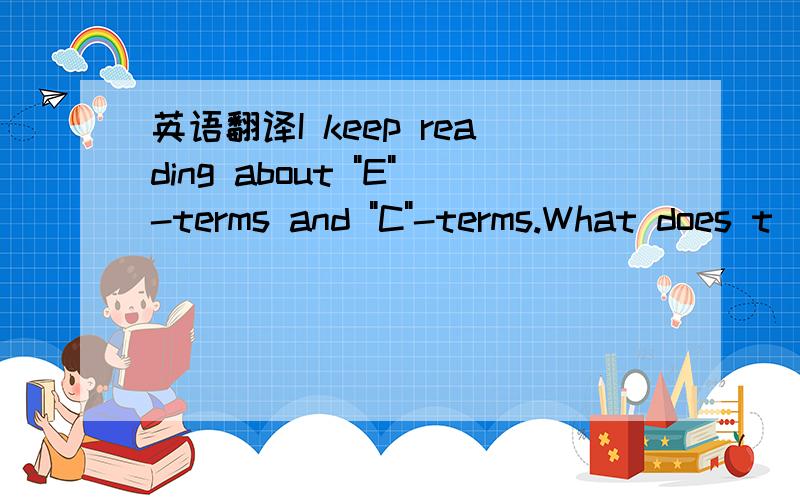英语翻译I keep reading about "E"-terms and "C"-terms.What does t
来源:学生作业帮 编辑:大师作文网作业帮 分类:综合作业 时间:2024/11/13 23:49:57
英语翻译
I keep reading about "E"-terms and "C"-terms.What does that mean?
Incoterms 2000,like its immediate predecessor,groups the terms in four categories denoted by the first letter in the three-letter abbreviation.
Under the "E"-term (EXW),the seller only makes the goods available to the buyer at the seller's own premises.It is the only one of that category.
Under the "F"-terms (FCA,FAS and FOB),the seller is called upon to deliver the goods to a carrier appointed by the buyer.
Under the "C"-terms (CFR,CIF,CPT and CIP),the seller has to contract for carriage,but without assuming the risk of loss or damage to the goods or additional costs due to events occurring after shipment or dispatch.
Under the "D"-terms (DAF,DES,DEQ,DDU and DDP),the seller has to bear all costs and risks needed to bring the goods to the place of destination.
这个E/F/C/D有什么不一样?
I keep reading about "E"-terms and "C"-terms.What does that mean?
Incoterms 2000,like its immediate predecessor,groups the terms in four categories denoted by the first letter in the three-letter abbreviation.
Under the "E"-term (EXW),the seller only makes the goods available to the buyer at the seller's own premises.It is the only one of that category.
Under the "F"-terms (FCA,FAS and FOB),the seller is called upon to deliver the goods to a carrier appointed by the buyer.
Under the "C"-terms (CFR,CIF,CPT and CIP),the seller has to contract for carriage,but without assuming the risk of loss or damage to the goods or additional costs due to events occurring after shipment or dispatch.
Under the "D"-terms (DAF,DES,DEQ,DDU and DDP),the seller has to bear all costs and risks needed to bring the goods to the place of destination.
这个E/F/C/D有什么不一样?

楼主,这是贸易术语.
在2000通则下,贸易术语分为E组,F组,C组和D组.
有什么不一样呢,当然是买方和卖方承担的责任、风险和费用不一样啦.
贸易术语就是为了规定清楚买卖双方承担的责任、风险和费用而设定的.
E组术语下只有一个,就是EXW,指卖方在自己的处所把货物提供给买方.
F组包括FCA,FAS,FOB,卖方必须按买方的指示交运货物,有买方指定承运人.
C组包括,CFR,CIF,CPT,CIP,卖方承担运输费用,不承担货物到达目的港的风险.风险在装运港就转移给买方了.
D组包括,DAF,DES,DEQ,DDU 和 DDP,卖方必须负责将货物运送到约定地点或目的地,并负责货物到此地点的一切费用和风险.
上面的不是翻译,是我总结的,
在2000通则下,贸易术语分为E组,F组,C组和D组.
有什么不一样呢,当然是买方和卖方承担的责任、风险和费用不一样啦.
贸易术语就是为了规定清楚买卖双方承担的责任、风险和费用而设定的.
E组术语下只有一个,就是EXW,指卖方在自己的处所把货物提供给买方.
F组包括FCA,FAS,FOB,卖方必须按买方的指示交运货物,有买方指定承运人.
C组包括,CFR,CIF,CPT,CIP,卖方承担运输费用,不承担货物到达目的港的风险.风险在装运港就转移给买方了.
D组包括,DAF,DES,DEQ,DDU 和 DDP,卖方必须负责将货物运送到约定地点或目的地,并负责货物到此地点的一切费用和风险.
上面的不是翻译,是我总结的,
英语翻译I keep reading about "E"-terms and "C"-terms.What does t
英语翻译Relationships don’t need promises,terms and conditions.I
英语翻译Discharging Terms and Conditions C.Q.D.(Customary Quick
英语翻译Introduction1.These Terms and Conditions (“Terms”) form
If k=x/3 and x≠0,what does 3x equal in terms of A.k B.9k C.9
英语翻译I have more questions about the payment terms.We are cur
英语翻译I have more questions about the payment terms..We are cu
英语翻译15.That the form of General Terms and Conditions to be e
terms and conditions是什么意思
Terms and conditions
英语翻译delivery terms:DDU HKpayment terms:prepay
英语翻译1) The terms of payment and the establishment of L/C wil